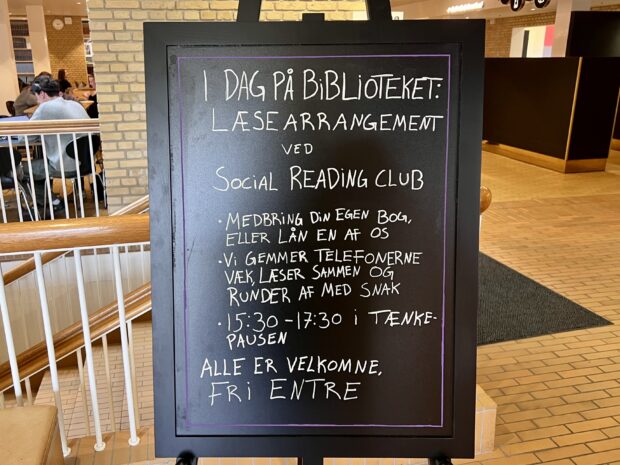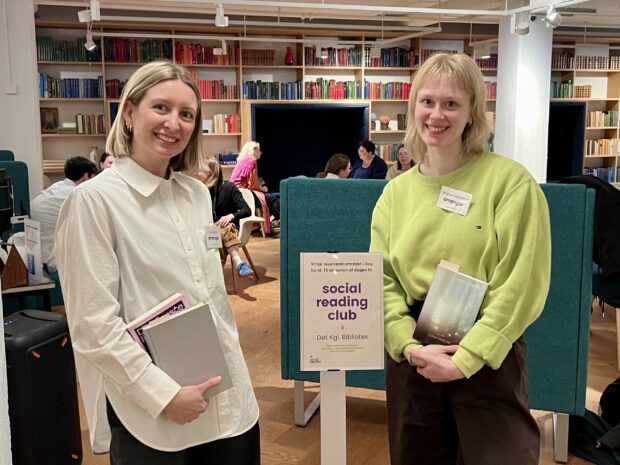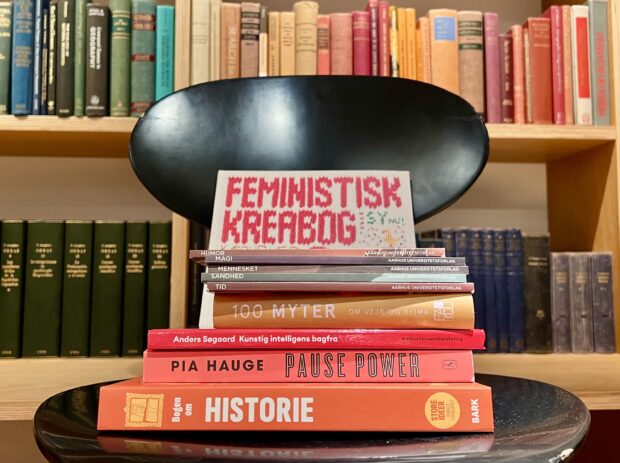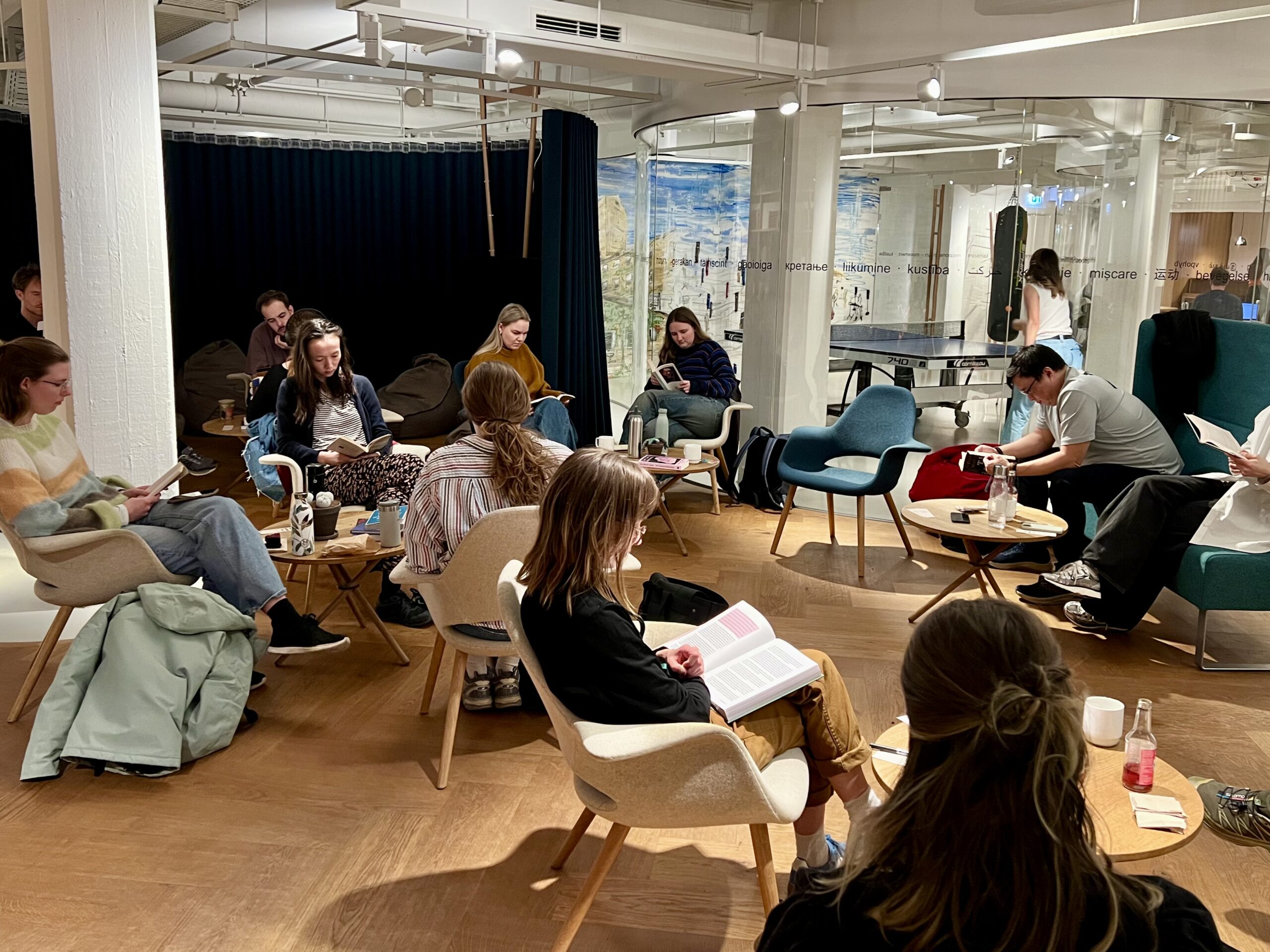“Something is rotten in the state of Denmark.” I remember this quote from Bonjour Tristesse by Françoise Sagan as I take out my book from my backpack. I cannot hide my amusement at discovering Shakespeare’s line in the French novel I bought last summer in Paris. Back then, I was probably not aware that I would be reading this book after moving to Denmark – and certainly not under these circumstances.
Now here I am, in Aarhus, at the Det Kongelige Bibliotek (Royal Library), holding my Penguin Classics editions in my hands, ready to spend the next two hours with it. But we will not be alone. Around twenty other book lovers will share their favourite activity with me. The space is set up invitingly – small coffee tables, colourful chairs, comfy-looking bean bags – all arranged for the upcoming reading session. Each of us has brought our own book: novels, nonfiction, research papers, as physical copies, e-readers or laptops. As I sit in the cozy corner I have found myself I see more and more people of all ages gathering – eagerly waiting for the event to begin. This is the Social Reading Club.

Unlike traditional book clubs, where the readers read the same book and usually meet monthly to discuss it, this club is about reading together – no matter what each reader’s heart desires at the moment. You can bring your own book or pick one that is offered there by the hosts of the event. The Social Reading Club is designed to be a community that emphasises the act of reading, explains Gudrun Middelboe, one of the four organizers of this event. “We wanted to create something where everyone feels invited to be part of, to create a format as loose as possible. You don’t commit to anything; you just show up. You just need the will to read, together with other people.”
And that’s exactly what I did. I showed up at the event and brought my French novel as well as my willingness to read. While waiting, I check out my surroundings and the books that are arranged on the tables. A woman around my mother’s age approaches me and asks me in Danish if she can sit next to me. Thanks to her gestures I understand her and reply: “Sorry, I don’t speak Danish. But yes, sure, you can sit here!” Of course, she asks me where I was from – the obligatory small-talk question for someone who does not speak the local language. And just like that we enter an interesting and heart-warming discussion about cultural differences between Germany, where I come from, and Denmark. In that moment, I understand the social aspect of the Social Reading Club.
The Club was born in September 2024. Laura Sjørup one of the founders, was inspired by a similar reading club in New York that she had heard of on social media. Along with her three colleagues Gudrun Middelboe, Oline Skamris Kristensen and Christoffer Kaas Nissen she now organizes these meetups once a month, sometimes even twice. Usually, the club gathers at cafés or bars in Aarhus such as Café Mellemfolk or Fairbar. But today it is a special collaboration with the Royal Library. “Yes, the four of us are volunteering here but I would say we are more than volunteers,” Middelboe says. “We are co-founders of this club.”. The four met during their internships at Aarhus Litteraturcenter, which now supports the club with funding and promotion on their social media channels.

After a short welcome the first 40-minutes reading session begins. At first, when everyone is suddenly opening their books, it feels like a race. But quickly I learn that it is not a competition at all but rather a safe space for reading-enthusiasts. Everyone seems to be deeply focused on their own book, everyone is drawn into a wide range of different literature-worlds. I’m used to reading alone in my own room, so it takes me a while to adjust. Mentally I should be at the Côte d’Azur– just like the protagonist of my story. But there are plenty of thoughts crossing my mind which keep pulling me back to Aarhus: What are the others reading? Is anyone watching me? Do I make too much noise when I turn the pages?
Just like me, Middelboe is used to read by herself: “I haven’t really shared reading with anyone even though I love to read. And I thought I personally would love to have a format to come and share that love of mine. I found it very intriguing to try something I haven’t done before.” She is 24 years old and studies Aesthetics and Culture in her Master’s. Since it is a very broad study, you have to follow your own path, she explains to me. Because she loves literature, she decided to go along with it.
As time passes, I finally sink into Bonjour Tristesse, almost feeling the Mediterranean sun on my skin while I lay on the beach at the Côte d’Azur. Despite initial distraction I have the feeling that by the end of the reading session I have read more efficiently than I would usually do at home. Why? Because I did not check my phone and then accidentally got stuck on it for 15 minutes scrolling on Instagram – as it usually happens at home. Here, I resisted my urge to get my phone out of my pocket. Seeing others read pressured me to stay focused. I guess, this is the kind of peer pressure we need when it comes to reading. Now, I also understand the reading part in the Social Reading Club.
The club aims to offer a space where people can go in depth with reading – a space where you can concentrate on your book. That requires putting your phone aside and ignoring it for the next hours. “We recommend to not use the phone. We will check the time for you, so you do not have to worry. You just have to enjoy your reading”, says Middelboe.
After the first session we take a short break before the final round. Conversations spark – about hobbies, work, university, and, of course, books. Most are in Danish, but I also overhear some in English. Mckynzie King, a 26-year-old library science student from the USA, is here for her second time. She loves literature and even has a book club with her family. For a recent paper she analysed the Social Reading Club and identified special user needs. “They are going to need a social atmosphere. This is something that is being created, not something you arrive with”, explains King.
According to King it is very easy to get in touch with other people at the reading club since you already have a common interest: books. As an international herself, she thinks it is a great idea to join the Social Reading Club: “It is an easy way to be social. It is a passive way of doing it. Maybe you happen to talk to someone, maybe you happen to meet somebody. It is easier to come here if you are alone, especially if you have an obvious goal like reading. It facilitates conversations.” Middelboe also recommends coming here to get a new experience with reading as well as to meet new people, especially if you are new in Aarhus.
By the end of the afternoon, I have finished Bonjour Tristesse – leaving me with a satisfied feeling. What is more, on my reading journey I had the chance to meet some new people and learn more about them. Before leaving, I ask Middelboe about the next event. I want to join next time to share my passion for literature with the other booklovers and maybe even make new friends. This is when I finally understand the club part in the Social Reading Club. With anticipation, I am looking forward to the next reading session on April 9th at Åben Bar or April 30th at Det Kgl. Bibliotek Aarhus.
I pack my French novel Bonjour Tristesse in my backpack and think about which book I can bring next time. Maybe it will be my German novel Vaterländer by Sabin Tambrea which talks about leaving your home country and starting a new life somewhere else.















